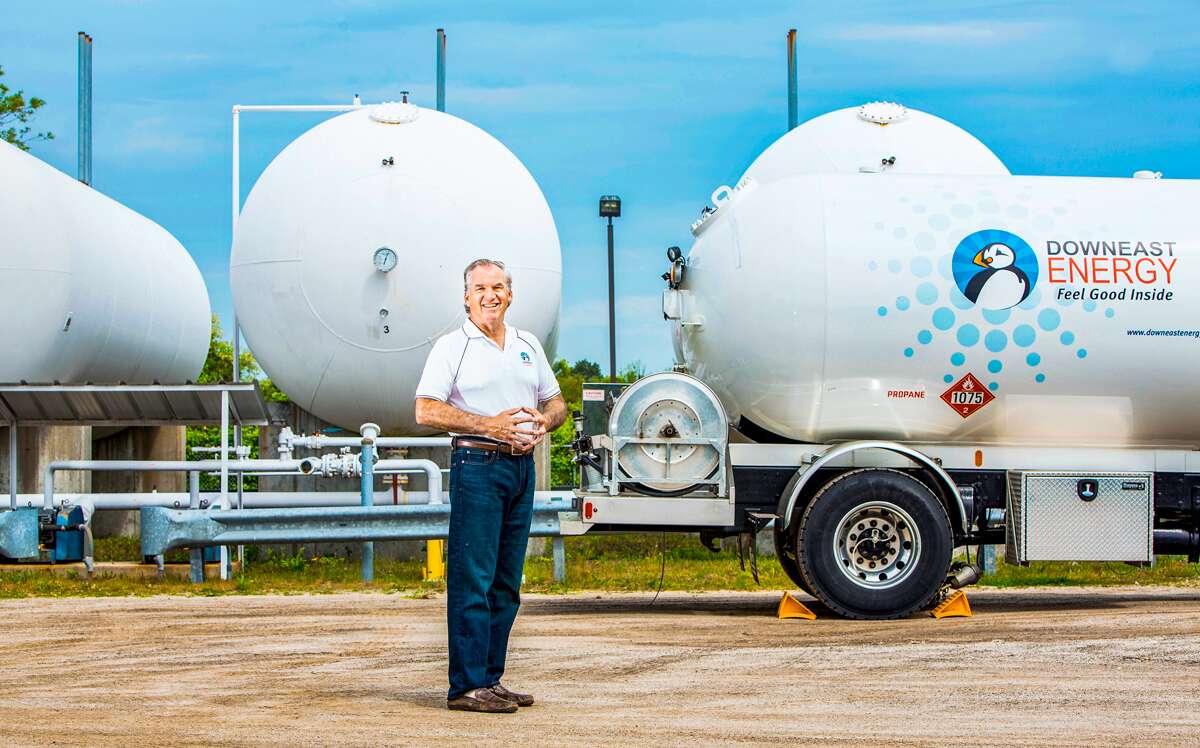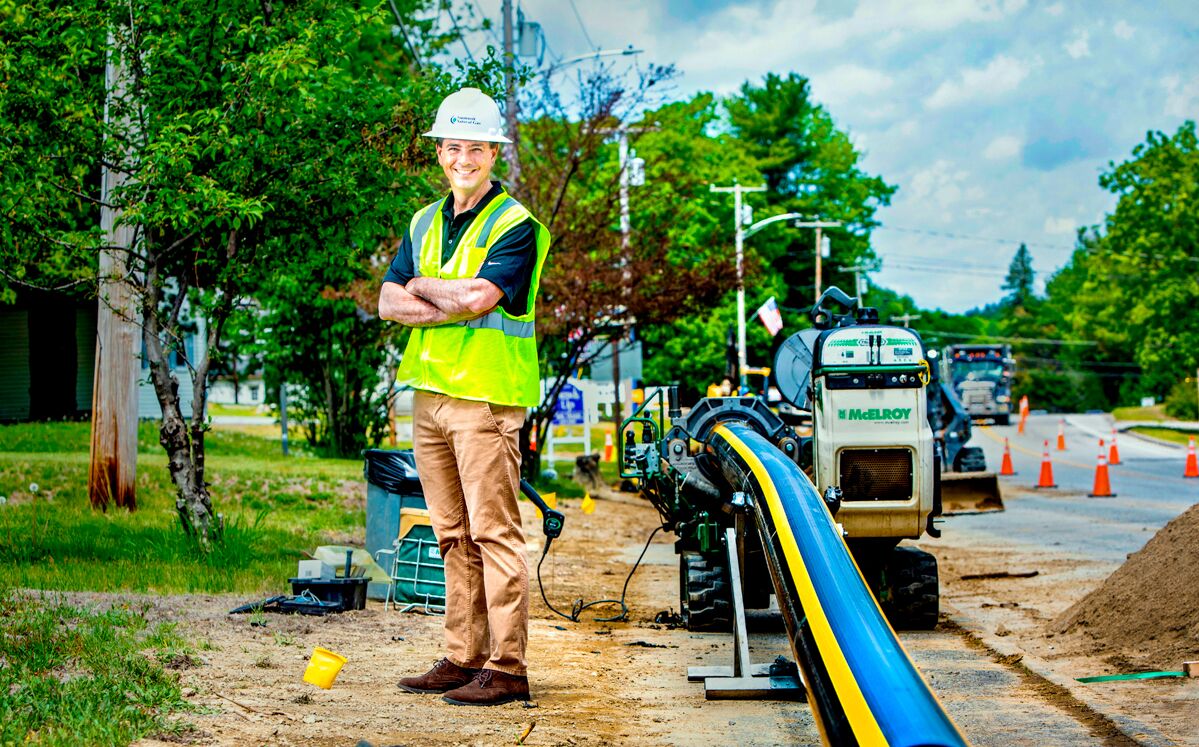
Nervous energy: The industry is jittering over pandemic's fallout
 Photo / Tim Greenway
Summit Utilities Inc. President and CEO Kurt Adams witnessed softening natural gas markets for some sectors, but an opportunity to accelerate infrastructure projects, like a $3 million pipeline build-out underway in Farmingdale.
Photo / Tim Greenway
Summit Utilities Inc. President and CEO Kurt Adams witnessed softening natural gas markets for some sectors, but an opportunity to accelerate infrastructure projects, like a $3 million pipeline build-out underway in Farmingdale.
When the pandemic struck in Maine, Summit Utilities Inc. saw demand for natural gas decline in the industrial sector.
“We’re seeing industrial load consumption coming and going,” says Kurt Adams, president and CEO of the Yarmouth-based company. “Industrial facilities might have stopped one shift; they might have a two-week furlough.”
Usage also softened in the commercial sector, as stores closed or reduced operations. Unsurprisingly, the residential sector stayed steady as people hunkered down in their homes.
But taken together, lower demand in some sectors along with Summit’s suspension of disconnection and late fees, which have resulted in unpaid invoices, have impacted the company’s finances.
“We’re all trying to figure out how deep and long this will go,” Adams adds.
Accelerating projects
One might think that uncertainty might hurt Summit’s infrastructure projects, including a $3 million pipeline build-out underway in Farmingdale.
On the contrary, says Adams, Summit is accelerating those and other projects.
“One unique role of a utility is that, when the economy gets soft, we have the opportunity to be part of the solution,” he says. “One way we can help is putting people to work.”
The combination of circumstances at Summit illustrates the various roads energy companies are navigating in a time of volatility driven by the pandemic and economic meltdown. Demand for fuel oil and electricity plunged when much of the economy shut down.
Still, with people hunkered down at home, there’s increased interest in renewables and more discussion about energy consumption and where energy comes from.
The International Energy Agency, a Paris-based forum of industrialized countries, expects worldwide energy use to decline by 6% this year. U.S. and European markets are projected to use 10% less energy, with oil taking the biggest hit. That would be the steepest decline since World War II, says Andrew Price, president and COO of Competitive Energy Services, who was part of a Zoom panel discussion convened mid-May by Environmental and Energy Technology Council of Maine, or E2Tech.
Less oil consumption has meant producers have taken wells offline, which influences the market for natural gas.
“As oil production slows, there’s less associated natural gas that comes up with the oil and we’re starting to see that impact in the natural gas markets,” which is down 5% since the beginning of April and is projected to decrease 10% over the next month or two, Price says.
Each sector of the energy industry has experienced the pandemic in different ways, as the following anecdotes show.
Natural gas
As a natural gas delivery company, Summit has kept a close eye on the waning demand. But Adams views uncertainty as a chance to build resiliency.
“What we learned is that we can never sleep at the wheel,” he says. “Utilities in Maine did a good job standing up during the pandemic. But it’s a wake-up for all of us. We’re learning to create even more robust processes so we can be there for the next crisis.”
A simple example was the move to remote work.
“We moved our entire customer service department home over a weekend, like many businesses,” he says.
Many employees didn’t have the digital infrastructure needed at home. Some didn’t have reliable internet service.
“One thing we learned is that we need to start thinking about that on the front end, as opposed to, ‘Let’s adapt our system to the home,’” he says. “What if we built an IT system to support remote employees no matter where they are, and let them choose where they work?”
That resilience would translate to other emergencies, such as storms.
“They become less powerful in disrupting our business,” he says. “If we focus on these things, we learn about resilience.”
Heating oil
Michael McCormack agrees. He’s vice president of energy-growth and innovation leader at Downeast Energy, a Brunswick-based heating oil and propane delivery business. He’s also chairman of the Maine Energy Marketers Association.
“Right off the bat, we knew that as the world started to change, the industry had to up its game to make sure we continue to service customers,” says McCormack.
The decline in demand has been especially apparent with tourism-related businesses.
From the operational standpoint, Downeast intensified practices already in place — the use of personal protective equipment and implementation of online customer service.
“We were PPE disciples before COVID,” McCormack says. “Now — even more, as we go about our business to ensure our employees and customers remain safe.”

For example, drivers are trained in safety practices for deliveries. They carry face shields in case of a spill.
“When COVID came along, it was easier for us to translate that: ‘Now you’ll have hand sanitizer, you’ll have masks and gloves,’” he says. “Our employees were accustomed to that. That helped us get through.”
Downeast’s online customer service presence is seeing a new demographic.
“There’s a paradigm shift happening: People are home and they’re saying, ‘I’ve got to learn to use this technology,’” he says. “I see that as being long-term.”
Many employees were new to working from home. McCormack maintains a culture of support.
“One thing we do, and I require from my leadership team, is reach out to all of our employees daily: ‘How are you doing? Thank-you for your efforts,’” he says. “Every time I see a manager, I thank them and then I say, ‘I want you to make phone calls to your team and thank them.’”
Fuel oil
H.A. Mapes Inc., which distributes gasoline and diesel to gas stations across New England, said the pandemic put an immediate dent in business, with demand off 25%.
“That has a direct correlation on staffing,” says Jonathan Mapes, CEO of the Springvale-based company. “So we have concerns. We’re a strong company but it’s tough to forecast.”
Declines varied based on location.
“Some stores, depending on where they are, held steady,” he says. “But we have customers on the Canadian border that probably should have closed their doors” with the shutdown of international travel.
One area of strength was convenience stores, which serve food and sometimes serve as a town center.
“People have an interesting relationship with convenience stores,” Mapes continues. “I think of them as mini town halls. They’re also food centers. With restaurants being closed, convenience stores saw an increase in food sales,” making them one-stop shops for customers also gassing up.
For commercial fuel drivers, declining consumption means fewer hours.
“Drivers are driving less, which puts a great deal of worry on them,” Mapes says. “If one thing comes out of this, it’s that drivers are worried about their jobs. We’re a strong company so we’ll be here. But what the next 18 months will be is extremely hard to forecast.”
Solar
In February, ReVision Energy’s president and co-founder, Fortunat Mueller, was initially concerned about continuity in the supply chain for solar energy installations.
Much of that supply starts in China, which was the first economy to close because of the pandemic. But supply turned out to be a non-issue. In fact, disruption of installations and projects getting pushed back likely resulted in excess capacity in the U.S., Mueller says.
Focusing on safety for employees and customers, ReVision nevertheless curtailed projects on occupied residences in April and May. Installations on new residential construction and some unoccupied residences continued. Some of the crew was furloughed, although many returned in June. Commercial installations, where social distancing is easier to maintain, remained on track.
Operational changes include measures such as limiting staff to one installer per truck. Customer interactions have gone online. The business already had a robust digital footprint, but that was typically complemented with in-person events such as open houses.
“We have a pretty intensive sales approach where we do a lot of customer education, talking about projects to electrify their homes,” says Mueller. “It’s easier to do that across the kitchen table. We had to learn to do those things online.”
ReVision has seen growing interest in solar and in residential battery storage since the start of the pandemic.
“I think that has to do with people spending more time at home, using more electricity in their homes, and understanding or appreciating the value of resiliency in those spaces,” he says.
He adds, “There is an opportunity as we come out of this crisis, in particular as we think about economic recovery. The clean energy sector is well-positioned to be part of the recovery. There’s an opportunity to put a lot of shovel-ready projects on the ground and put people back to work quickly.”














0 Comments